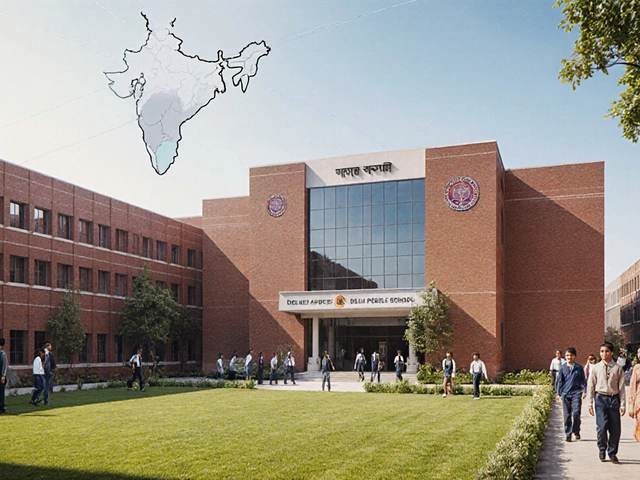
In today's dynamic world of education, the decision to pursue a graduate degree is more significant than ever. With numerous options available, the choice between an MBA and a Master's can feel overwhelming. Both paths offer unique benefits and challenges, and understanding their distinctions is crucial.
If you're contemplating further education, knowing what each program entails can lead to a more informed choice. Whether you're looking for a career shift, aiming for advancement, or seeking personal development, this juncture presents an opportunity to redefine your future.
Understanding the essence of these two academic routes not only clarifies what they have to offer but also empowers you to make decisions aligned with your personal ambitions and professional aspirations.
- Understanding MBA and Masters
- Career Opportunities and Prospects
- Cost and Investment Value
- Specializations and Curriculum
- Choosing the Right Program
- Long-term Impact on Career and Life
Understanding MBA and Masters
When contemplating higher education, one of the pivotal decisions often made is selecting between an MBA and a Masters degree. Both represent advanced learning, but they cater to different career pathways and learning goals. An MBA, or Master of Business Administration, is active in its focus on business management and operational decision-making. It's designed for individuals seeking leadership roles and is often pursued by those balancing work with study. Unlike a general MSc or MA program, the MBA gears more toward case studies, real-world applications, and developing strategic thinking needed for tackling business challenges.
On the flip side, a Master's degree hones in on a particular field. Whether it's specializations within the sciences, humanities, or technical sectors, a Master's is known for its depth in a focused subject area. This is ideal for those pursuing academia or careers requiring technical expertise. Typically, the coursework emphasizes theoretical knowledge over practical application compared to an MBA. The structure often includes research components, forming a bedrock for those considering a Ph.D. Moreover, in various countries and institutions, there's a substantial difference in curriculum prerequisites, with Master's degrees sometimes necessitating a thesis or comprehensive examinations.
An important aspect of deciding between these two is considering personal career objectives. If you're bolstering depth in a specific field, an MSc or MA provides that niche, specialized expertise. On the contrary, those wishing to switch industries or climb the corporate ladder might find the practical and leadership-oriented curriculum of an MBA more rewarding. A compelling statistic presented by the Graduate Management Admission Council suggests that 89% of employers planned to hire MBAs in 2023, a nod to its growing dominance and the continued value companies place on business acumen and leadership skills.
Reputed educational resources, like Harvard Business Review, often propose that aspiring students consider their long-term goals and immediate needs. As noted, "It's not just about the degree but the experience, network, and skills gained."
If you're aiming for a career where leading teams, managing projects, and strategic planning is central, the MBA paves the way with its versatile, real-world approach.Whereas, if your passion lies deep in a specific topic, envisioning work as a subject matter expert, a Master's is your gateway.
Factors like program duration can also play a crucial role in your choice. Generally, an MBA spans 1 to 2 years for full-time studies, with part-time options extending this. A Master's program might mirror this timeframe but differs by discipline. Financial implications also vary significantly, with MBA programs often demanding higher tuition due to their comprehensive business content and prestige. Scholarships and financing for either program demand early planning and research to ensure alignment with prospective career returns.
Navigating the decision to pursue an MBA or Master's isn't merely picking a degree; it's a pivotal career decision laced with personal aspirations, financial investments, and future goals. Reflecting on what you envision for your professional future while weighing the distinct benefits each program offers allows a choice well-suited to your growing potential.
Career Opportunities and Prospects
When considering an MBA or a Masters degree, understanding the career landscape each presents is essential. Both degrees open doors to various industries, but they cater to different aspirations and roles. An MBA is often associated with leadership and managerial positions, providing the skills required to tackle complex business challenges. Graduates with an MBA might find themselves steering companies as consultants, project managers, or even entrepreneurs. The competitive edge of an MBA is particularly pronounced in sectors such as finance, consulting, and executive management where strategic decision-making is crucial.
On the flip side, a Masters degree is generally more specialized, allowing professionals to become experts in a particular field. Whether in data science, engineering, education, or the arts, a Masters can pave the way for roles that demand in-depth knowledge and technical skills. Those with a Masters might pursue careers in research and development, teaching at a higher level, or leading specialized projects. The advantage here lies in the depth of expertise, making these graduates valuable assets in their chosen domains.
Beyond the general roles, the choice between these degrees impacts long-term career trajectories. Statistics suggest that while both paths lead to success, MBA holders often reach higher managerial positions faster, thanks to their leadership training and networking opportunities. On the other hand, Masters graduates may enjoy fulfilling careers as revered specialists, though their ascent to top-tier leadership roles might follow a longer path.
"The value of a graduate degree, whether an MBA or a Masters, is not just in the knowledge gained but in the doors it opens and the networks built," says a report from The Graduate Management Admission Council.
Interestingly, the prospect of salary significantly influences the decision too. Typically, MBAs tend to command higher starting salaries in business roles compared to their Masters counterparts. However, this varies by industry and region. For instance, a Masters in Computer Science may out-earn an MBA in markets where tech skills are in steep demand.
Additionally, the scope of opportunities often lies in geographical markets as well. Internationally, an MBA may hold more prestige in certain economies, while a Masters might carry more weight in others, based on the demand for specialized knowledge versus managerial capabilities. Aspiring professionals should weigh these factors, considering both current economic trends and projected industry growth when deciding their educational path.

Cost and Investment Value
When considering the journey of higher education, the financial aspect often stands as a significant factor in decision-making. The cost of pursuing an MBA or a Masters can vary widely, depending on several elements such as the institute's prestige, the program's location, and its duration. Typically, an MBA tends to be a more substantial financial investment compared to most Master's programs, with tuition fees regularly crossing six figures, especially at top-tier business schools. However, this substantial investment often correlates with a promising return in terms of salary increments and career advancements post-graduation.
Prospective students should ponder not just the tuition but also the potential earnings boost and career growth that an MBA or Masters degree can bring. In many cases, MBA graduates report a significant increase in their earning potential, sometimes even doubling their pre-MBA salary. According to a survey by the Graduate Management Admission Council, the median salary for MBA graduates in 2023 was around $115,000, which marked a significant hike compared to non-MBA peers.
"Investing in a graduate degree like an MBA or a specialized Masters could be one of the wisest career moves, provided it's aligned with your long-term professional goals," advises Dr. Melanie Ramirez, an economic consultant.
When calculating the investment value, one must also consider not just the immediate costs but potential scholarships, fellowships, and assistantships that could reduce the burden. Many institutions offer financial aid packages specifically designed to ease students into such life-changing educational paths. For those interested in MBA programs, it's essential to note that a full-time course might imply a temporary absence from the workforce. Therefore, opportunity cost, which encompasses the salaries and experience forgone, plays a vital role in this decision.
Let's take a look at a brief table showcasing estimated tuition fees for various types of MBA and Master's programs:
| Program Type | Average Tuition Fee |
|---|---|
| Full-time MBA | $120,000 |
| Part-time MBA | $80,000 |
| Online MBA | $60,000 |
| Master's in Data Science | $50,000 |
| Master's in Education | $40,000 |
In contrast, Masters programs often bear a lower financial burden and some appealing traits, such as shorter duration and targeted specialization. These aspects can facilitate quicker re-entry into the job market and may even result in equally lucrative positions depending on the field. A career in data science or technology, supported by a specialized Master's degree, might yield impressive salary figures similar to those of MBA graduates.
Specializations and Curriculum
Diving into the realm of MBA and Masters degrees, one quickly finds a diverse array of specializations and curricula. Each path offers tailored knowledge suited to distinct areas of interest. For those considering an MBA, the program often emphasizes broad business acumen. You might choose from fields like finance, marketing, or entrepreneurship, each shaping the way you approach business challenges. The curriculum generally covers a wide range of management topics, from organizational behavior to strategic planning, ensuring graduates are well-rounded leaders.
On the other hand, a Masters program tends to dive deeper into specific disciplines. Consider a Masters in Computer Science, for instance. The focus here would be on acquiring expertise in areas such as artificial intelligence, machine learning, or software development. The approach is usually more academic, emphasizing theoretical foundations paired with practical applications. This level of specialization equips students to become experts in their chosen fields, ready to tackle complex issues with in-depth knowledge.
Choosing Your Path
Deciding between an MBA and a Masters isn't just about the subjects you will study but also about the approach to learning. MBA programs are often cohort-based, promoting networking and team-based projects. This fosters a collaborative environment where ideas flourish, and real-world problems are tackled collectively. A Masters, in contrast, might offer more individual study, with detailed research components and the ability to focus intensively on a niche area of interest.
Interestingly, a 2023 survey by the Graduate Management Admission Council revealed that MBAs tend to prioritize leadership skills, while Masters students often seek in-depth knowledge. The survey highlighted that 58% of MBA alumni felt their degree significantly boosted their leadership capabilities. This shows how MBA programs are designed not just to impart knowledge but to cultivate strong leaders ready to innovate and inspire in diverse environments.
Curriculum Design and Flexibility
Universities worldwide design their curriculums according to these objectives. While an MBA may introduce you to financial modeling one week, it might have you working on a marketing case study the next, keeping the learning dynamic and varied. In comparison, Masters programs typically involve a highly structured set of courses with an emphasis on research methodologies, culminating in a thesis or capstone project. This format suits those who have a clear notion of their area of interest and want a more in-depth exploration.
Modern educational trends have also brought innovations in delivery methods. Online learning and hybrid models are increasingly popular, making these degrees more accessible. Whether engaging in a strategy simulation in an MBA class or conducting an intricate experiment for a Masters thesis, students today are equipped with diverse tools and resources, bridging geographical and experiential gaps.

Choosing the Right Program
Deciding on the right academic path, whether an MBA or a Masters, is akin to drawing a map for your future. This decision isn't just about the education you receive, but the trajectory it sets for your career. Start by evaluating your ultimate career goals and how each degree could potentially propel you toward them. Do you aspire to a leadership role centered around business strategy and operations? An MBA might be your answer. Vibrant discussions and dynamic frameworks in an MBA program allow you to understand the comprehensive mechanisms of businesses. Conversely, if your interest lies in specialized knowledge, a Masters allows for an intense focus on a particular field.
Your personal circumstances and preferences factor significantly into this equation. The pacing, structure, and environment of these programs can differ vastly. Full-time or part-time, online or in-class—these choices must match your lifestyle. Ask yourself the all-important questions: Can you commit to a rigorous schedule as in a full-time MBA? Or does a part-time Masters program align better with your current life obligations? A noteworthy concept from a prominent career coach emphasizes,
"Education is not just about filling a pail, but lighting a fire—choose the program that keeps your fire burning."Implementing these considerations is key in choosing wisely.
Financial considerations and the value of your investment play a substantial role in this decision. Analyze the tuition against potential ROI unique to each path. MBA programs often command higher tuitions because of their extended network and comprehensive case studies, yet they promise substantial returns with opportunities in higher management positions. On the contrary, a Masters may afford a more affordable upfront cost with robust returns in specific industries such as tech or healthcare. Compare tuition fees and analyze potential salary increases. Data indicates that graduates from top-tier MBA programs can earn significantly more compared to their Masters counterparts, especially in corporate settings, which could be an enticing factor for many.
If you're still on the fence, speaking to alumni and attending open days or informational sessions can yield firsthand insights. Engaging with industry professionals or educational consultants often demystifies common misconceptions and enables prospective students to view the big picture. Many educational institutions also offer career fairs and networking events, providing valuable touchpoints in understanding potential outcomes. Create a rubric of priorities you have for your MBA or Masters, and weigh them against the offerings of your shortlisted programs. Trust your instincts and remember, the key to choosing the right program lies in selecting the one that best fits your vision of the future.
Long-term Impact on Career and Life
When contemplating the long-term effects of earning an MBA or a Masters, one must consider how each will shape your career trajectory and personal growth. An MBA is often associated with high-level leadership roles, offering a robust network of alumni and industry connections. With this path, the career possibilities are broad and diverse, ranging from corporate management to entrepreneurial ventures. The program's focus on business strategy, real-world problem-solving, and team collaboration equips graduates with skills to tackle complex business environments confidently.
In contrast, a Masters degree, particularly one with a specialized focus, can lead to deeply knowledgeable expertise in specific fields such as science, technology, or humanities. This depth can be a significant advantage in academic or research positions and sectors that value specialized knowledge. As industries evolve, professionals with niche skillsets can become national leaders in their domains, driving innovation and progress.
Financially, an MBA typically commands higher initial salaries and opportunities for rapid advancement in corporate settings. Reports have shown that MBA graduates can experience salary increases of up to 50% after graduation, while Masters holders see a steady growth path with opportunities to become critically valuable in their fields. A career in either path can lead to reputable positions, yet the nature of work and influence can differ significantly.
On a personal level, pursuing advanced degrees can lead to profound personal development. You are constantly challenged to think critically, solve problems, and collaborate with diverse groups of peers. For many, the experience instills a strong sense of confidence, perseverance, and intellectual curiosity. It's not uncommon for graduates to emerge with a broader worldview and a refined set of beliefs and values. An interesting fact to note is that studies suggest advanced degree holders are often more engaged in civic and community efforts, likely due to the leadership qualities honed during their education.
"Education is the most powerful weapon which you can use to change the world." - Nelson MandelaGraduates may use their advanced skills to influence positive change not just within their companies, but also in broader societal contexts. The ripple effect of their education influences future generations, contributing to a globally informed and responsible citizenry.
In a world that values adaptability and innovation, an MBA or Masters can set the foundation for sustained professional growth and personal fulfillment. While the direct impact may vary depending on individual goals, the ability to navigate and lead in an ever-changing landscape remains a common outcome. Education is, after all, a lifelong investment that extends far beyond the walls of a classroom. As you ponder your path, consider not only where you want to go but who you want to become. The journey may redefine both your career and your life in ways that are yet to be imagined.





